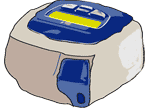Sleep Apnea Treatment
Learn How to Treat Sleep Apnea
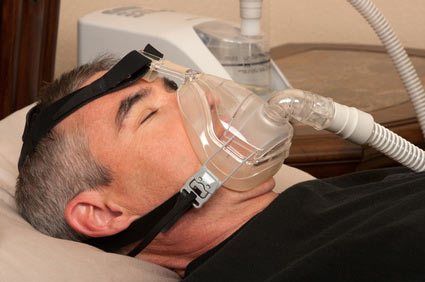
An effective sleep apnea treatment includes continuous positive airway pressure therapy (CPAP), surgical options, oral appliances, and weight loss.
In this page you'll also discover optional treatments such as positional therapy, herbal remedies, exercises and other natural remedies.
If you want to start any of these treatments, remember to discuss with your doctor if it's safe enough for you.
Different people, different causes, different treatments
There is no "one size fits all" model for treating people with sleep apnea. No two patients are alike. Although many of the symptoms of sleep apnea are the same, individualized treatment planning is crucial.
STANDARD Sleep Apnea Treatment:
Continuous Positive Airway Pressure (CPAP)
CPAP is the most commonly used sleep apnea treatment, involving the delivery of positive air pressure into the airway to pneumatically splint the airway to maintain space for breathing.
The air is delivered through a hose (tube) and a mask:
- nasal mask,
- nasal pillows,
- or full face mask.
Benefits and Side Effects of CPAP Therapy |
|
Benefits |
Side Effects |
Reduces or eliminates apneas, |
Dry mouth, nose, or throat, |
Reverts oxygen levels to normal, |
Uncomfortable feeling of pressure, |
Decreases daytime sleepiness, |
Irritation of nasal passages, |
Improves sleep quality, |
Chest discomfort, |
Deeper stages of sleep, |
Swallowing and aerophagia, |
Eliminates morning headaches, |
Skin irritation from mask |
Treats heart problems, |
Claustrophobia |
Improves mood and depression. |
Irritation of the bridge of the nose |
For more info about benefits from CPAP therapy, see CPAP benefits.
Surgery For Sleep Apnea
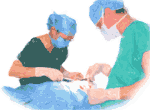
Surgery treatment focuses on increasing the upper airway area, to reduce the obstruction during sleep.
The most common surgical options for sleep apnea are:
- Uvulopalatopharyngoplasty,
- Pillar Procedure,
- Genioglossus advancement,
- Hyoid Suspension,
- Turbinate Reduction,
- Deviated Septum,
- Tongue Reduction,
- Laser-assisted Uvulopalatoplasty,
- Tracheostomy.
Unfortunately, surgery is not always effective in treating sleep apnea, and can have serious side effects:
Side effects from sleep apnea surgery:
- difficulty swallowing and nasal regurgitation (vomiting) - 31%,
- voice changes - 13%,
- taste disturbances - 5%,
- death - 0.2%.
Read the clinical study source.
For more on side effects from surgery, see Surgery for sleep apnea.
Dental Devices for Sleep Apnea
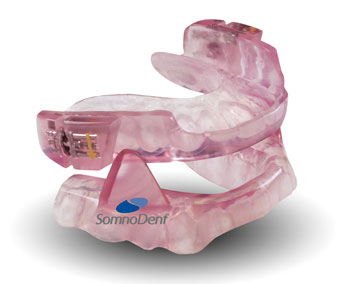
Dental devices are used to modify the position of the mandible and tongue, to increase the space of the airway.
They are usually prescribed and fitted by dentists with qualification in sleep medicine.
The most common oral appliances for OSA are:
How Effective are Dental Devices for Sleep Apnea?
Dental appliances are effective for mild and moderate OSA compared with surgeries, but less efficacious than CPAP. In general, the oral devices are recommended for patients who decline CPAP. Read here the Clinical Study.
For more on dental appliances, see Sleep apnea dental device.
Weight Loss
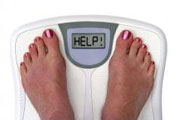
Weight loss can be a very effective sleep apnea treatment, as long as obesity is the major risk factor for OSA.
OSA patients with severe obesity may benefit from bariatric surgery or gastric bypass.
The weight loss challenge
Mild and moderate patients can even cure OSA through lifestyle changes, such as diet and exercise.
Although lifestyle change is difficult, the multiple benefits are far more satisfying than using a CPAP machine, a dental device, or having surgery. Read the Clinical Study.
Related articles about obesity in sleep apnea patients:
Alternative Sleep Apnea Treatment
Fortunately, some mild and moderate cases of obstructive sleep apnea can be improved with:
- positional therapy,
- special exercises,
- yoga,
- singing with didgeridoo
- and many other natural remedies.
Every alternative treatment targets a specific cause of sleep apnea, so it's important to know what is causing your obstruction.
For more on alternative treatments, see Cures for Sleep Apnea.
Bottom line...
It will be very helpful for you to research about sleep apnea condition, and learn all you can about it. It's your health, your body, and your responsibility, and you are the one who will live with the consequences of poor care!
Sleep Apnea Guide › Sleep Apnea Treatment
